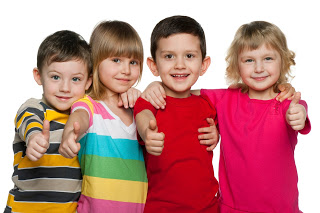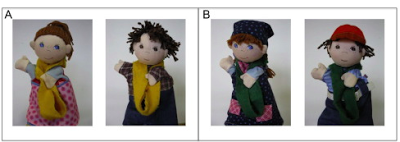Neuroscience
 Psychologists interested in the way group loyalty develops through childhood have largely focused on young children's preference for other kids who demonstrate loyalty. For example, one study found that four- and five-year-olds rated other children as nicer and more trustworthy if they pledged continued allegiance to their losing team, compared with when they said they wanted to switch to the winning side. Other research has found that children aged five to eight years say they will be loyal to their group, for example by continuing to support a losing sports team, but before now such loyal proclamations have not been put to the test.
Psychologists interested in the way group loyalty develops through childhood have largely focused on young children's preference for other kids who demonstrate loyalty. For example, one study found that four- and five-year-olds rated other children as nicer and more trustworthy if they pledged continued allegiance to their losing team, compared with when they said they wanted to switch to the winning side. Other research has found that children aged five to eight years say they will be loyal to their group, for example by continuing to support a losing sports team, but before now such loyal proclamations have not been put to the test.
Published in The Journal of Experimental Child Psychology, a new study is the first to test young children's willingness to make sacrifices in the name of group loyalty. Antonia Misch and her colleagues recruited 48 five-year-olds and 48 four-year-olds, with an equal number of girls and boys in each age group. The researchers tested each child individually and began by introducing them to four hand puppets.
Next, yellow and green scarfs pulled from a box were used to allocate two puppets and the child to one team (either the green or yellow team) and the other two puppets to the other coloured team. The child then left the room with the researcher, ostensibly to help look for something, and on returning discovered two puppets, either from their own team or the other team (depending on the in-group or out-group condition) hiding a book. The puppets explained the book was a secret and urged the child not to tell anyone where it was. A short time later, a fifth puppet with no group affiliation (they wore no scarf) appeared and said they knew a secret had been hidden in the room. This puppet attempted to bribe the child with stickers to get them to reveal the secret.
Overall, 61 per cent of the children resisted the temptation to reveal the secret. But the key finding is that more children chose to keep the secret when they were urged to do so by puppets in their own team as opposed to the other team (75 per cent vs. 48 per cent). This in-group loyalty effect was present at both ages, suggesting the motivating effect of group loyalty is already present by age 4. However, there was an overall effect of age on the ability or willingness to keep the secret – averaging across the in-group and out-group conditions, 71 per cent of five-year-olds kept the secret compared with 52 per cent of four-year-olds.
The researchers said that their findings "extend previous research on children's verbal predictions of their own loyalty and children's attitudes about other people's loyalty in demonstrating that even in direct social interactions where children are tempted to be disloyal, they can choose to remain loyal." The findings are all the more striking given that the groups were so arbitrary and had only been formed a few minutes earlier. Misch and her team said that it's likely children would feel an even keener sense of loyalty and identification with their real life groups.
________________________________
Misch A, Over H, & Carpenter M (2016). I won't tell: Young children show loyalty to their group by keeping group secrets. Journal of experimental child psychology, 142, 96-106 PMID: 26513328
Post written by Christian Jarrett (@psych_writer) for the BPS Research Digest.
Our free fortnightly email will keep you up-to-date with all the psychology research we digest: Sign up!
- The Amazing Durability Of Infant Memory: Three-year-olds Show Recognition Of A Person They Met Once At Age One
The fate of our earliest memories is something of an enigma. As adults, most of us are unable to recall memories from before we were age three or four. And yet, as toddlers we are perfectly capable of storing and recalling memories from before that age....
- At What Age Do Children Recognise The Difference Between Sarcasm And Irony?
People hold strong feelings about the meanings of irony and sarcasm. Just look at the reaction to Alanis Morissette's global hit 'ironic' - despite commercial success, the apparent misunderstanding of irony conveyed by the song provoked a...
- How To Praise Children
When we praise a child, our wording can either be specific (e.g. “You did a good job drawing”) or generic (e.g. “You are a good drawer”). According to Andrei Cimpian and colleagues this subtle distinction can make a big difference to children's...
- Does The Way Mothers Think About Their Difficult Children Matter?
Early findings have shown that the mothers of badly behaved young children think about their child’s behaviour in a characteristic way, tending to believe that their bad behaviour is intentional and has to do with the nature of the child rather than...
- Helping Children By Teaching Them To Look Away
Teaching young children to look away while they are thinking could help improve their problem-solving abilities. Fiona Phelps and colleagues at Stirling University recruited 20 five-year-old children and videoed them while they answered a range of verbal...
Neuroscience
By age four, children are already willing to make sacrifices in the name of group loyalty

Published in The Journal of Experimental Child Psychology, a new study is the first to test young children's willingness to make sacrifices in the name of group loyalty. Antonia Misch and her colleagues recruited 48 five-year-olds and 48 four-year-olds, with an equal number of girls and boys in each age group. The researchers tested each child individually and began by introducing them to four hand puppets.
 |
| Puppets used in the study. Figure from Misch et al |
Overall, 61 per cent of the children resisted the temptation to reveal the secret. But the key finding is that more children chose to keep the secret when they were urged to do so by puppets in their own team as opposed to the other team (75 per cent vs. 48 per cent). This in-group loyalty effect was present at both ages, suggesting the motivating effect of group loyalty is already present by age 4. However, there was an overall effect of age on the ability or willingness to keep the secret – averaging across the in-group and out-group conditions, 71 per cent of five-year-olds kept the secret compared with 52 per cent of four-year-olds.
The researchers said that their findings "extend previous research on children's verbal predictions of their own loyalty and children's attitudes about other people's loyalty in demonstrating that even in direct social interactions where children are tempted to be disloyal, they can choose to remain loyal." The findings are all the more striking given that the groups were so arbitrary and had only been formed a few minutes earlier. Misch and her team said that it's likely children would feel an even keener sense of loyalty and identification with their real life groups.
________________________________

Misch A, Over H, & Carpenter M (2016). I won't tell: Young children show loyalty to their group by keeping group secrets. Journal of experimental child psychology, 142, 96-106 PMID: 26513328
Post written by Christian Jarrett (@psych_writer) for the BPS Research Digest.
Our free fortnightly email will keep you up-to-date with all the psychology research we digest: Sign up!
- The Amazing Durability Of Infant Memory: Three-year-olds Show Recognition Of A Person They Met Once At Age One
The fate of our earliest memories is something of an enigma. As adults, most of us are unable to recall memories from before we were age three or four. And yet, as toddlers we are perfectly capable of storing and recalling memories from before that age....
- At What Age Do Children Recognise The Difference Between Sarcasm And Irony?
People hold strong feelings about the meanings of irony and sarcasm. Just look at the reaction to Alanis Morissette's global hit 'ironic' - despite commercial success, the apparent misunderstanding of irony conveyed by the song provoked a...
- How To Praise Children
When we praise a child, our wording can either be specific (e.g. “You did a good job drawing”) or generic (e.g. “You are a good drawer”). According to Andrei Cimpian and colleagues this subtle distinction can make a big difference to children's...
- Does The Way Mothers Think About Their Difficult Children Matter?
Early findings have shown that the mothers of badly behaved young children think about their child’s behaviour in a characteristic way, tending to believe that their bad behaviour is intentional and has to do with the nature of the child rather than...
- Helping Children By Teaching Them To Look Away
Teaching young children to look away while they are thinking could help improve their problem-solving abilities. Fiona Phelps and colleagues at Stirling University recruited 20 five-year-old children and videoed them while they answered a range of verbal...
